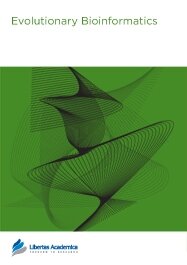

Publication Date: 06 May 2009
Type: Short Report
Journal: Evolutionary Bioinformatics

The phylogenetic analysis of nucleotide sequences and increasingly that of amino acid sequences is used to address a number of biological questions. Access to extensive datasets, including numerous genome projects, means that standard phylogenetic analyses can include many hundreds of sequences. Unfortunately, most phylogenetic analysis programs do not tolerate the sequence naming conventions of genome databases. Managing large numbers of sequences and standardizing sequence labels for use in phylogenetic analysis programs can be a time consuming and laborious task. Here we report the availability of an online resource for the management of gene sequences recovered from public access genome databases such as GenBank. These web utilities include the facility for renaming every sequence in a FASTA alignment fi le, with each sequence label derived from a user-defined combination of the species name and/or database accession number. This facility enables the user to keep track of the branching order of the sequences/taxa during multiple tree calculations and re-optimisations. Post phylogenetic analysis, these webpages can then be used to rename every label in the subsequent tree fi les (with a user-defined combination of species name and/or database accession number). Together these programs drastically reduce the time required for managing sequence alignments and labelling phylogenetic figures. Additional features of our platform include the automatic removal of identical accession numbers (recorded in the report file) and generation of species and accession number lists for use in supplementary materials or figure legends.
PDF (1.95 MB PDF FORMAT)
RIS citation (ENDNOTE, REFERENCE MANAGER, PROCITE, REFWORKS)
BibTex citation (BIBDESK, LATEX)
PMC HTML
According to my experience as a co-author, I recommend potential authors to publish their innovative bioinformatics work in Evolutionary Bioinformatics. I am particularly satisfied with the rapid and high-quality review process, proofs delivery and eventual publication.

All authors are surveyed after their articles are published. Authors are asked to rate their experience in a variety of areas, and their responses help us to monitor our performance. Presented here are their responses in some key areas. No 'poor' or 'very poor' responses were received; these are represented in the 'other' category.See Our Results
Copyright © 2013 Libertas Academica Ltd (except open access articles and accompanying metadata and supplementary files.)
Facebook Google+ Twitter
Pinterest Tumblr YouTube